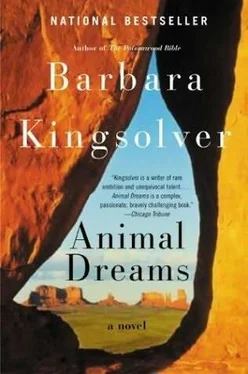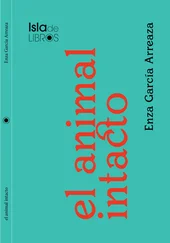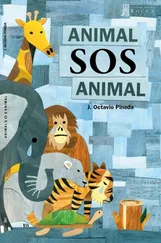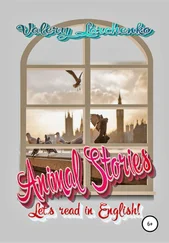On the last Monday of October Rita Cardenal made three announcements to the class: she was quitting school, this was her last day, and if anybody wanted her fetal pig they could have it, it was good as new.
We’d plowed right through the animal kingdom in record time, having had nothing to look at in the way of protozoans. We’d made a couple of trips back to the river and had given due attention to the amphibians and Mr. Bad Fish, whose glass home grew more elaborate with each field trip and was now called the Frog Club Med. There were fern palm trees and a mossy golf green, and the frogs obligingly did high-impact aerobics all over everything. Now we were up to exploring the inner mysteries of an unborn mammal, which had to be purchased mail order.
But Rita hadn’t had the stomach to cut into hers, and I couldn’t blame her, all things considered. She was expecting twins. She said she was dropping out because she felt too tired to get her homework done; I feared for these children’s future.
Rita wore about half a dozen earrings in one ear and had a tough-cookie attitude, and I liked her. She’d been a good student. She seemed sorry to go but also resigned to her fate, in that uniquely teenage way of looking at life, as if the whole production were a thing inflicted on young people by some humorless committee of grownups with bad fashion sense. I was disappointed but unsurprised to lose Rita. I’d been watching her jeans get tight. The pregnancy dropout rate in Grace was way ahead of motor-vehicle accidents, as a teenage hazard. Rita was a statistic. On Tuesday I made my own announcement: we were doing an unscheduled unit on birth control.
The reaction in the ranks was equal parts embarrassment and amazement. You’d think I’d suggested orgies in study hall. There was some hysteria when I got to the visual aids. “Look, there’s nothing funny about a condom,” I said, pretending to be puzzled by their laughter. “It’s a piece of equipment with a practical purpose, like a…” Only the most unfortunate analogies came to mind. Shower cap. Tea cozy. “Like a glove,” I said, settling for the cliché. I turned from the blackboard and narrowed my eyes. “If you think this thing is funny, you should see the ridiculous-looking piece of equipment it fits over.” The guys widened their eyes at each other but shut up. I was getting the hang of this.
“Miss,” said Raymo. They’d never learned to call me Codi.
“What is it?”
“You’re gonna get busted for this.”
I finished my diagram, which looked somewhat more obscene than I would have liked. I brushed my chalk-dusty hands on my jeans and hopped up to sit on the tall lab bench that served as my desk. “I know some of your parents might not be too thrilled about this field of study,” I said, thinking it over. “I didn’t get permission from the school board. But I think we’d better take a chance. It’s important.”
“Okay then, tell us something we don’t know,” said Connie Muñoz, who had even more holes punched in her left ear than Rita. I wondered if this was some kind of secret promiscuity index.
“Shut up, Connie!” said Marta. (Pearl studs, one per earlobe.) “My dad would kill me if he thought I knew this stuff.”
“What you do is between you and your dad,” I said. “Or not. Whatever. But what you know is my business. Obviously you don’t need to put everything you know into practice, just like you don’t have to go spraying the fire extinguisher around because you know how to use it. But if your house is already on fire, kiddos, I don’t want you burning down with it just because nobody ever taught you what was what.”
Raymo shook his head slowly and said again, “Busted.” He drew the laugh he wanted.
“You know what, Raymo?” I asked, tapping a pencil thoughtfully against my teeth.
“What?”
“It doesn’t matter a whole lot what the school board thinks.” This dawned on me forcefully as I said it. I understood this power: telling off my boss at the 7-Eleven, for example, two days before I left Tucson. The invulnerability of the transient. “There’s nobody else to teach this course,” I said. “And I only have a one-year contract, which I wasn’t planning on renewing anyway. I’m not even a real teacher. I’ve just got this provisional certification deal. So that’s the way it is. We’re studying the reproductive system of higher mammals. If I’m offending anybody’s religion or moral turpitude here, I apologize, but please take notes anyway because you never know.”
They were completely quiet, but toward the end of the day you really can’t tell what that means. It could be awe or brain death, the symptoms are identical.
“Miss?” It was Barbara, a tall, thin, shy student (ears unpierced), whose posture tried always to atone for her height. She’d latched onto me early in the semester, as if she’d immediately sniffed out my own high-school persona. “You aren’t coming back next year?”
“Nope,” I said. “I’m outta here, just like a senior. Only difference between you and me is I don’t get a diploma.” I gave them an apologetic smile, meant for Barbara especially. “It’s nothing personal. That’s just my modus operandi.”
The kids blinked at this, no doubt wondering if it was a Latin name they needed to write down.
“Your modus operandi is the way you work,” I said. “It’s what you leave behind when you split the scene of a crime.”
At Grace High I taught Biology I, Biology II, two study halls, and I also pinch-hit an algebra class for a fellow teacher who was frequently absent on account of a tricky pregnancy. My favorite class was Biology II, my seniors-Raymo and Marta and Connie Muñoz and Barbara-but on that day I had a mission and didn’t discriminate among souls. I gave everybody the lecture on baby prevention. Barbara, who was in my study hall and also in the algebra class, got to hear it three times, poor child, and I imagine she was the least in need.
It surprised me as much as the kids, this crusade, and I suspected my motives; what did I care if the whole class had twins? More likely I wanted to be sure of a terminal contract. After the last bell rang I erased the blackboard and stood for a minute sharing the quiet with the bones of my Illinois compatriot, Mrs. Josephine Nash. Our day was over. She gave me her silent, wide-jawed smile. Here was a resident of Grace who had never hurt me in childhood, didn’t make me rack my memory for her name (she wore it on her pelvis), had thrown no spitballs at me nor asked for extra credit, and didn’t suggest that I belonged in Paris, France, or a rock ’n’ roll band.
From the back of the room I could hear the frogs clicking against the sides of their terrarium, constant as a clock: up and down, up and down, exposing soft white bellies. This time next year there would not even be fish or frogs in the river; these particular representatives of the animal kingdom were headed for extinction. Whoever taught this class would have to write Carolina Biological Supply and order those stiff preserved frogs that smell of formaldehyde, their little feet splayed like hands and their hearts exposed.
I stood over the terrarium and peered down into it from above, like a god. The fish hung motionless in its small lake. Droplets of condensation were forming on the underside of the glass top. Getting ready to rain in there. I’d grown fond of this miniature world, along with the kids, and had added my own touches: a clump of bright red toadstools that popped up in Emelina’s courtyard, and a resurrection fern from the cliff behind my house. The terrarium was like a time capsule. I think everybody was trying to save little bits of Grace.
Читать дальше












